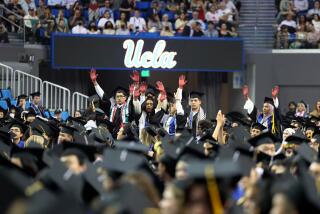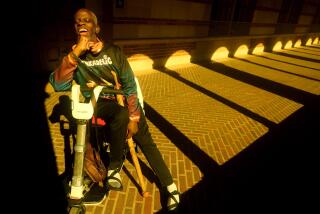Doctors Said He Was Retarded : Honors Graduate Had an Uphill Fight
- Share via
When Julian C. Cummings was 2 years old, doctors thought he was mentally retarded because he had poor balance and trouble with motor skills.
“Obviously, they were wrong,” an elated Cummings said Tuesday at UC Berkeley, where he had just learned that he had won the University Medal, the school’s highest honor for the graduating class of 5,750.
The 22-year-old senior from Huntington Beach, who is described as “spirited and articulate” and “energetic” by university officials, is graduating with a 3.966 grade point average with majors in physics and astronomy. Cummings, who has received numerous science and other achievement awards, will become a doctoral student in plasma physics at Princeton University in the fall.
Cummings also happens to be disabled.
Cummings was born a “gray baby,” a medical term for babies who suffer from a loss of oxygen in the womb. He developed scoliosis, or curvature of the spine, and suffered nerve damage throughout his body. He had poor muscle tone and substandard balance and motor skills.
When he was very young, he underwent ankle and back surgery to try to correct his condition. But mostly, he said, doctors did not know what to do for him.
“I don’t think my handicap was well understood when I was young,” he said.
Cummings said it was his parents who helped him to realize that his physical limitations didn’t have to limit him intellectually.
“I was never made to feel like I was a big burden on them,” he said. “They were always careful to make me feel like I was just another kid.”
He said his mother, a science teacher, and his father, a lawyer, were both ecstatic to learn that he’d won the University Medal.
“They get pretty excited about these things,” Cummings said. “Maybe I downgraded it too much for them. When I heard I was a finalist, I told them I didn’t have a prayer of winning.”
“We’re happy to know him,” said his mother, Diane Cummings, who lives in Huntington Harbour. But she was surprised to learn that he had won the honor among 5,750 graduates, a detail their son did not share with her or her husband, Edward.
“We are very proud of him,” she said.
Being named this year’s outstanding graduate is only one of Cummings’ many achievements.
Work on Science Projects
Last summer, he worked with the Plasma Theory and Simulations Group in Berkeley’s Electrical Engineering and Computer Sciences Department. The summer before that, he was a scientific technician at the Magnetic Fusion Energy Division of the Lawrence Livermore National Laboratory. He also has worked as a physics aide at the U.S. Naval Research Laboratory in Washington.
He plans to pursue the field of plasma physics, he said, “because I want to make a contribution to fusion energy.”
But Cummings has other interests besides academics. He is active in the Berkeley Chess Club, for example. He is also a member of the Berkeley College Republicans.
Cummings said he decided to become involved in university’s Republican group after he overheard someone saying they couldn’t understand how minorities or disabled people could support Republicans.
“I didn’t think that was a fair statement,” he said. “I don’t formulate my political opinions on what’s going to fill my pocketbook and that’s what this person assumed (about Republicans).”
After a trip to Europe in June, Cummings said, he will drive to Princeton to begin work as a lab assistant.
Although he has some difficulty with his balance, Cummings, who gets around without the aid of a wheelchair or crutches, said some people might not notice that he is disabled. But his condition, which includes arthritis, can sometimes make it painful to walk.
Diane Cummings said that because her son’s physical limitations kept him from participating in high school athletics, “he chose to go the more intellectual route.” But in general, he has “sort of ignored” his disability, she said. “You can give (a disability) as much weight (in your life) as you want to, but he’s never let it slow him down.”
Said the Berkeley senior, “I compensate very well. I’ve gotten pretty good at walking long distances or charging up and down stairs with a big stack of books.
“I don’t want people to know me as handicapped first and a student at Berkeley second.”
More to Read
Sign up for Essential California
The most important California stories and recommendations in your inbox every morning.
You may occasionally receive promotional content from the Los Angeles Times.













